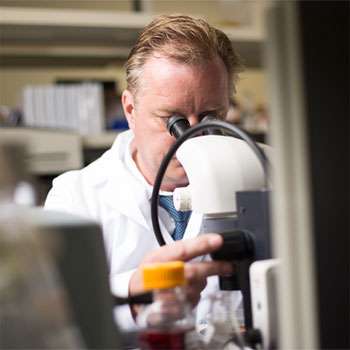Research Labs

The UCLA Department of Radiation Oncology is committed to a greater understanding of radiation therapy. Our Radiation Oncology Research Lab faculty members and students collaborate with colleagues around the university, and the world to advance their unique areas of research.
Our research labs are devoted to conducting translational research, a type of combined clinical and basic science investigation in which knowledge learned from the basic research in the laboratory with genes, cells, or animals is translated into therapeutic intervention in human subjects.
Our overall research mission is to continue this proven track record of success, to support innovation and to increase the clinical impact of research outputs through strengthened collaboration and knowledge sharing.
The Pajonk Lab
Frank Pajonk, MD, PhD
Our laboratory has a long-standing interest in signal transduction and the role of the 26S proteasome in cancer. We were among the first working with prospectively identified cancer stem cells and since then we have made seminal discoveries including the intrinsic radioresistance of breast cancer stem cells and its underlying mechanisms, developed innovative new techniques to image, track and target cancer stem cells in vitro and in vivo and uncovered fundamental differences in the metabolic state of cancer stem cells and their progeny. The Pajonk Lab
The Vlashi Lab
Erina Vlashi, PhD
The Vlashi laboratory is committed to pursuing projects with a high potential for translation to clinical practice for cancer patients, with a particular interest in improving the effect of radiation therapy (RT) for resistant tumors, such as glioblastoma multiforme and pancreatic ductal adenocarcinoma. The main research interests of our group focus on the metabolism of cancer cells, specifically on cancer cells with a cancer-initiating phenotype (cancer stem/initiating cells, CSC/CICs) and the changes induced by radiation therapy that ultimately lead to resistance. The Vlashi Lab
The Cacalano Lab
Nicholas A. Cacalano, PhD
The Cacalano lab studies the effects of aberrant signal transduction and gene regulation in tumor cells on resistance to radiotherapy, metastatic behavior, and stem-like properties in cancer. In particular, we are interested in how constitutively activated receptor tyrosine kinases and Wnt signaling promote tumor growth, spread, and resistance to therapy. Our interests also include how epigenetic silencing of kinase inhibitors such as the Suppressors of Cytokine Signaling (SOCS) dysregulates kinase activation, the function of STAT transcription factors and chemokine production, creating an immunosuppressive and tumor-promoting microenvironment. We currently apply these approaches to cancers of the brain, prostate, pancreas and lung. The Cacalano Lab
Iwamoto Laboratory of Quantum Radiobiology
Kei Iwamoto, PhD
As the Laboratory of Quantum Radiobiology, we use a fundamental theory in physics to interrogate the molecular mechanisms of redox-signaling biology that mediates cellular responses to ionizing radiation (IR). IR, by expelling electrons from molecules, creates highly unstable free radicals (FR) that damage cells. The damaged cells respond by generating their own FR, not necessarily as a death knell but more as a mode of intra- and inter-cellular communications to orchestrate a consequential outcome.
Our ultimate goal is to understand and control this network of FR-mediated communications to favorably enhance radiation sensitivity of tumors or radiation resistance of normal tissues to improve cancer treatment. To this end, we apply principles of quantum mechanics to alter the reactivity of FR and therefore modulate the cellular redox-sensitive signaling pathways that could determine cell fate.
One of our major endeavors is to precisely control specific FR lifetimes using FR-species-dependent electromagnetic fields (EMF) to modulate electron spin states. Notably and non-intuitively (because it is a quantum mechanical phenomenon, after all) weak EMFs (wEMF), no stronger than that of refrigerator magnets, have significant effects on biology vis-à-vis FR reactivity. Accordingly, we are the first lab to demonstrate the profound effects of a wEMF on the molecular biology of x-irradiated cells, which present an avant-garde approach ripe for investigation and exploitation to improve radiotherapy. This makes quantum radiobiology an exciting part of the fledgling and growing field of quantum biology. The Iwamoto Lab
The Dörthe Schaue Lab
Dörthe Schaue, PhD
We are small lab with a not so small mission. Most of what we do centers on the fundamental question of how irradiated normal tissues and cancers interface with the immune system and what this means for tumor immunity, normal tissue toxicity, and premature aging. Cells differ in intrinsic radiosensitivity, and this is a major reason for therapeutic failure. Since the immune system is in the field, radiation shapes the balance within the different immune cell subsets. At the same time, radiation-induced tissue damage releases danger signals that feed into common immune signaling pathways to generate responses. The consequences are multifaceted, ranging from altered anti-tumor immunity, tissue inflammation, and, in extremis, skewed hematopoietic output. The fact is that radiation exposure, even locally delivered, has systemic effects and immune responses are generated that evolve over time.
Our approach comes in many flavors. We study tumor-specific immune responses following radiation therapy (RT) in mice and men and have documented a regulatory signature that is both myeloid and lymphoid in nature and is an evolutionary conserved tissue healing response that is immunosuppressive and limits the effectiveness of currently FDA-approved immune-modulating agents. We also look for novel radiation biomarkers and avenues for mitigation of acute and late radiation syndromes. We have explored effects on the redox rheostat, immunoproteasomes, and antigen presentation. Ultimately, the goal is to differentially modulate normal tissue and tumor responses to radiation exposure so as to improve outcome. The Dörthe Schaue Lab
The Weidhaas Lab
Joanne B. Weidhaas, MD, PhD, MSM
We are a small but enthusiastic group of scientists passionate about using genetics to directly improve patient care in the near term. The Weidhaas Lab